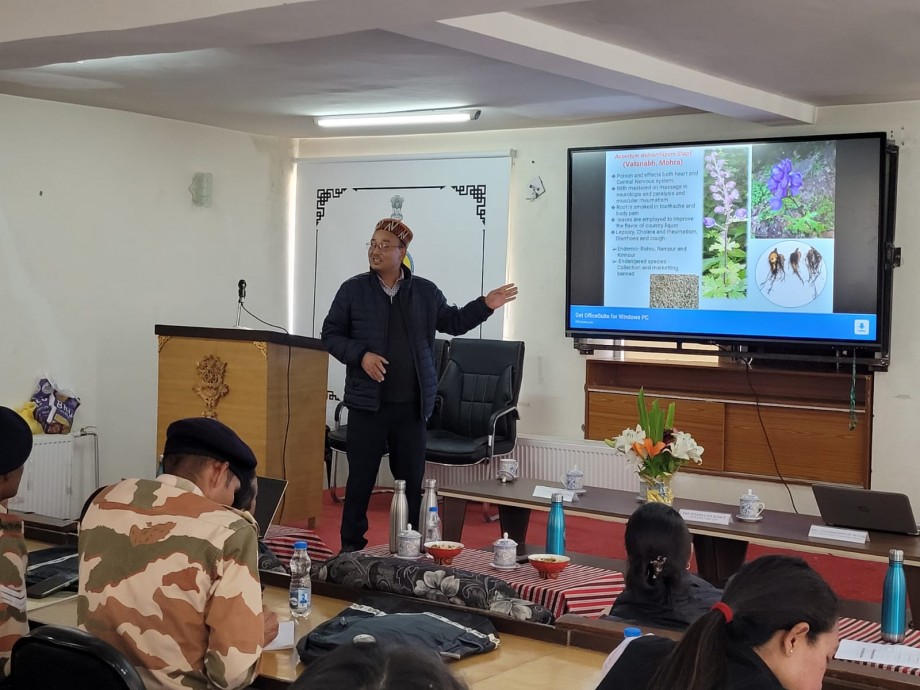ICRE-HFRI Shimla imparts training on cold desert medicinal plants

Three days training cum demonstration programme on cultivation and conservation of important cold desert medicinal plants for livelihood generation commenced at National Institute of Sowa Rigpa (NISR), Leh, UT Ladakh on June 12.
The training cum demonstration programme is being organised by ICFRE-Himalayan Forest Research Institute, Shimla, Himachal Pradesh for other stakeholders and is sponsored by the Ministry of Environment, Forests and Climate Change, Govt. of India.
The training programme is being attended by thirty representatives from different line departments including Agriculture, Horticulture, Education, Sowa Rigpa, ITBP, NGOs, etc.
Director, NISR, Leh, Dr. Padma Gurmet said that the cold desert Ladakh region under the Indian Trans Himalayas is an emporium of medical and aromatic plants resource in the country. He also talked about the Medical and Aromatic plants (MAP’s) of the cold desert region which are in great demand by pharmacies as well as for local consumption. As a result, the majority of them are threatened and face endangered status.
He elucidated the fact that large scale consumption and unscientific harvesting of medicinal and aromatic plants from the natural habitats has resulted in their extinction from the wild and presently ayurvedic and pharmaceutical industries are facing the problems of raw material. He also talked about traditional medicinal plants for healthcare and livelihood.
Chief Technical Officer, HFRI and training coordinator Dr. Joginder Singh Chauhan informed that the main objective of the training programme is to impart knowledge to the other stakeholders about rich medicinal wealth of cold-desert regions and train them as master trainers for further dissemination amongst various end users.
He also told that during this training programme, resources person from various research institutes and organizations like HFRI, CSIR- IIM, NISR, Ladakh University, etc will share their knowledge with the participants and field visits will be organised to provide tangible experiences and success stories if cultivation of medicinal plants.
Director, HFRI Shimla, Dr. Sandeep Sharma said that cultivation of medicinal plants by the local communities assumes paramount significance and may be adopted as an alternate income-generating source which may fetch considerable benefits and improve the living standard as well.
He emphasized the need of the hour is to put together the efforts to scale up the cultivation of medicinal plants out of natural ambience with proper scientific interventions and develop it as an sustainable source of income generation.
Dr. Sandeep Sharma also talked about the nursery and plantation techniques of Juniperus polycarpos (Shur/shupka), which is an important tree species of cold desert region. He informed that this species is very difficult and with intense research, the institute has developed nursery and plantation technique of the species and has disseminated it to forest department of Himachal Pradesh, UT Ladakh and UT J&K through training and demonstration programmes.
Besides this, the institute has distributed about two thousand plants in Leh and Kargil region of Ladakh to farmers and forest department.
Scientist, HFRI, Dr. Jagdish Singh said that heavy biotic pressure, ruthless extraction and illegal trade however are well acknowledged with other factors contributing to endangerment of medicinal plants. He added that cultivation of medicinal plants will reduce pressure on natural habits.
He also provided useful information about identification and uses of important cold desert medicinal plants.
Associate Professor, NISR, Dr. Tashi Stobgais also interacted with participants about status, propagation and ex situ cultivation of trans-Himalaya medicinal plants.





